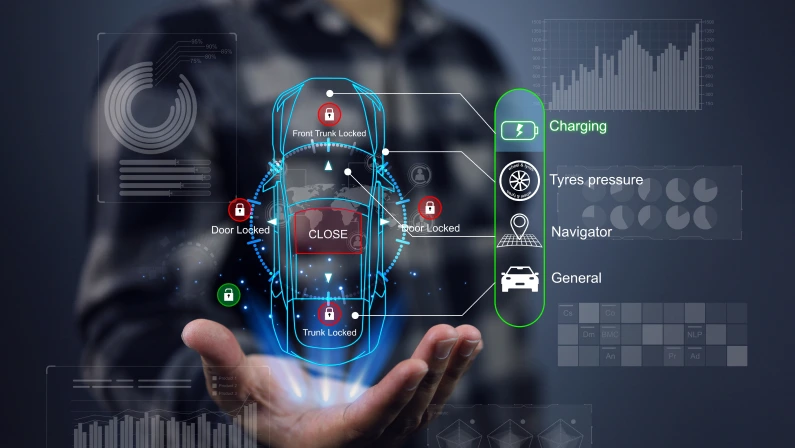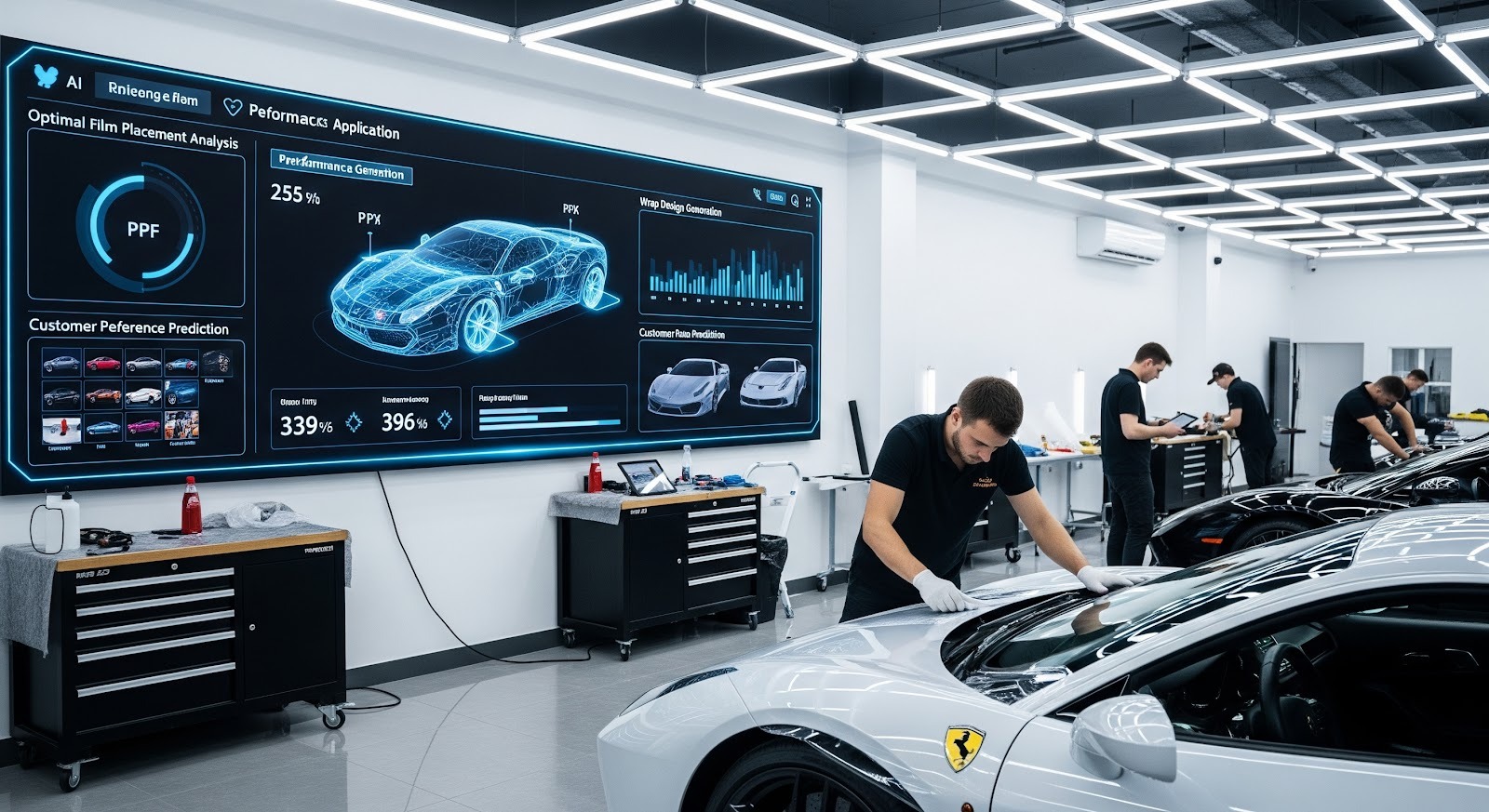
The automotive industry has entered a new era powered by artificial intelligence (AI). From self-driving vehicles to predictive maintenance systems, AI in the automotive industry is redefining how cars are designed, built, and driven. What was once considered futuristic is now part of everyday life, helping manufacturers increase efficiency, drivers stay safer, and businesses make smarter decisions.
The integration of artificial intelligence in the automotive market has gone beyond automation. AI now powers advanced analytics, real-time data interpretation, and intelligent systems that can adapt to changing environments. As vehicles become more connected and autonomous, the impact of AI in the automotive industry continues to expand, paving the way for smarter mobility and safer roads.
What Is AI in the Automotive Industry and How Does It Work?
AI in the automotive industry refers to the use of advanced algorithms, machine learning, and neural networks to enable vehicles and production systems to think, learn, and make decisions. These systems process vast amounts of data from sensors, cameras, and onboard computers to perform functions such as detecting obstacles, optimizing routes, and predicting maintenance needs.
In simple terms, automotive AI acts as the brain behind many modern vehicle systems. It helps machines interpret data, recognize patterns, and respond intelligently. This integration of AI in automobiles allows for continuous learning and improvement, making cars smarter, safer, and more efficient with every mile.
How Is AI Used in the Automotive Industry Today?
Here are the main ways AI in the automotive sector is applied:
Autonomous Driving
Self-driving cars rely on deep learning algorithms to analyze surroundings, detect objects, and make real-time driving decisions. This technology enables safer navigation, traffic flow optimization, and reduced human error.
Predictive Maintenance
AI in automotive manufacturing uses data from sensors to detect signs of wear or failure before they occur. Predictive systems alert owners or mechanics in advance, reducing costly breakdowns and improving vehicle reliability.
Driver Assistance Systems
Features such as adaptive cruise control, lane-keeping assistance, and automatic emergency braking are all powered by AI in automobiles. These smart systems enhance safety and reduce the cognitive load on drivers.
Quality Control in Production
Cameras and sensors equipped with AI in automotive manufacturing inspect components for defects faster and more accurately than human workers, ensuring consistent product quality.
Customer Experience Enhancement
Car manufacturers use automotive AI to personalize driver experiences, adjusting seat positions, temperature, and infotainment settings based on user preferences.
What Role Does AI Play in the Automotive Industry?
It serves as the foundation for transformation across every stage of the value chain:
- Design Optimization: AI analyzes design models to test aerodynamics and performance virtually before a physical prototype is made.
- Supply Chain Efficiency: By predicting demand and detecting delays, AI optimizes logistics and inventory management.
- Production Automation: Robotics and AI in automotive manufacturing streamline assembly lines and reduce human error.
- Sustainability Goals: AI assists companies in minimizing waste and optimizing energy use in factories and vehicles.
How Is AI Driving Innovation in Automotive Manufacturing?

The influence of AI in the automotive industry is especially visible in manufacturing. Here’s how it drives innovation:
Smart Factories
Manufacturers now use connected robots and IoT systems integrated with automotive AI to automate complex processes with precision and efficiency.
Defect Detection
Computer vision systems powered by AI in automotive manufacturing identify microscopic flaws that humans might miss, reducing recalls and improving product safety.
Predictive Analytics
Data-driven insights help managers forecast machine maintenance schedules, reducing downtime and production costs.
Adaptive Production Lines
AI enables flexible production, allowing lines to adjust automatically to new models or custom specifications without manual reconfiguration.
What Are the Benefits of AI in the Automotive Industry?

The benefits of AI in automotive industry operations are wide-ranging, influencing everything from design to customer satisfaction.
Increased Efficiency
AI automates repetitive tasks and streamlines workflows, allowing manufacturers to produce more vehicles in less time. By analyzing data in real time, AI also optimizes energy use, material management, and scheduling, which translates to faster turnaround and lower costs.
Enhanced Safety
Safety is one of the most significant benefits of AI in automotive industry applications. AI monitors driver behavior, road conditions, and vehicle performance to prevent accidents before they happen. Technologies such as automatic emergency braking, lane-keeping assistance, and collision detection have saved countless lives and reduced insurance claims.
Improved Product Quality
With the help of AI in automotive manufacturing, every step of production can be monitored with precision. Machine vision systems can spot imperfections that are invisible to the human eye, ensuring each part meets the highest quality standards. This not only enhances reliability but also strengthens consumer trust in automotive brands.
Cost Reduction
Predictive maintenance powered by automotive AI identifies potential issues before they lead to expensive repairs or downtime. This reduces operational costs for both manufacturers and drivers. Additionally, AI-driven supply chain management prevents overstocking and material shortages, improving financial efficiency.
Personalized Driving Experience
AI in automobiles tailors every ride to the driver’s preferences. From seat adjustments and music choices to adaptive lighting and climate control, AI learns user behavior over time. This personalization enhances comfort, satisfaction, and brand loyalty.
Environmental Sustainability
AI helps design more fuel-efficient vehicles and optimizes engine performance to reduce emissions. It also supports electric vehicle development by improving battery management systems and charging efficiency, contributing to a cleaner environment.
Data-Driven Decision Making
Manufacturers use AI in the automotive sector to interpret complex data and forecast market trends. This insight helps guide product development, marketing strategies, and business growth.
What Is the Impact of AI in the Automotive Industry on Drivers and Businesses?
The impact of AI in the automotive industry extends beyond manufacturing. For drivers, it means safer roads, intelligent navigation, and reduced fuel consumption. For businesses, it results in greater efficiency, reduced costs, and faster innovation cycles.
AI also allows companies to collect valuable customer data that drives product improvements and personalized services. As more vehicles connect to smart infrastructure, businesses can optimize transportation logistics and provide predictive after-sales support that strengthens customer relationships.
How Does AI Improve Vehicle Safety and the Driving Experience?
Safety remains a top priority, and AI in automobiles enhances it in several ways:
- Collision Avoidance Systems: AI monitors surroundings to detect hazards and automatically intervenes when necessary.
- Driver Monitoring: Cameras and sensors track driver alertness to prevent fatigue-related accidents.
- Real-Time Decision Making: AI instantly processes data to assist with braking, steering, and speed adjustments.
- Smart Navigation: AI helps drivers avoid traffic jams, identify hazards, and choose the fastest routes.
The driving experience also becomes more enjoyable and intuitive with automotive AI, as systems learn from user behavior and personalize interactions over time.
What Are the Challenges of Implementing AI in the Automotive Sector?
While the potential is immense, implementing AI in the automotive sector poses challenges:
- High Development Costs: Developing advanced AI models and integrating them into vehicles requires substantial investment.
- Data Privacy and Security: Vehicles collect vast amounts of data, making cybersecurity crucial.
- Regulatory Barriers: Laws around autonomous vehicles vary by region, slowing deployment.
- Ethical Considerations: Questions about liability in AI-driven decisions remain unresolved.
- Workforce Adaptation: As automation grows, companies must retrain workers to manage and maintain AI systems.
Platforms like Leapify are helping businesses overcome these challenges by offering data-driven solutions and automation tools that enhance decision-making across various industries, including automotive.
What Is the Future of AI in the Automotive Industry?
The future of AI in the automotive industry promises unprecedented innovation. Fully autonomous vehicles, AI-managed traffic systems, and intelligent road networks are all within reach. Manufacturers are investing heavily in research and development to make cars safer, greener, and more connected than ever before.
Moreover, artificial intelligence in the automotive market trends indicate a shift toward electric, shared, and software-defined vehicles powered by AI analytics and predictive intelligence. As technology evolves, AI will continue to shape every aspect of mobility, from smart infrastructure to personalized user experiences.
Accelerating the Road Ahead with AI

The integration of AI in the automobile industry has transformed how cars are built, driven, and maintained. From predictive maintenance to self-driving systems, AI continues to revolutionize mobility at every level. The journey ahead involves balancing innovation with safety, ethics, and sustainability.
Businesses looking to harness this power can benefit from an AI platform for the auto business that simplifies complex data and decision-making. With Leapify, automotive brands can leverage automation and analytics to gain a competitive edge, streamline operations, improve customer engagement, and drive growth in a rapidly evolving market. Contact us today!



